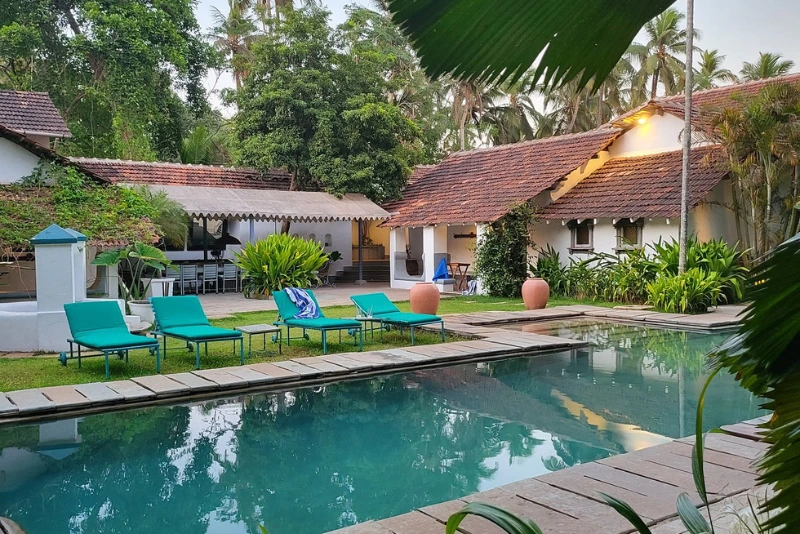Explore the Best Homestays in Goa: A Complete Guide for Travelers
Homestays are a form of accommodation where travelers stay in a private residence, usually with local hosts. Unlike hotels or resorts, homestays offer a more personal and culturally immersive experience. In Goa a coastal state in western India known for its beaches, Portuguese-influenced architecture, and vibrant lifestyle homestays have become a popular lodging option for both domestic and international travelers.
These accommodations range from traditional Goan villas and bungalows to modern apartments and countryside cottages. Whether you're visiting for relaxation, local cuisine, or heritage exploration, homestays allow you to experience Goa from a more grounded, community-based perspective.

Why Homestays in Goa Matter Today
A Shift Toward Local, Authentic Travel
In recent years, many travelers have moved away from mass tourism and are instead seeking meaningful connections with the places they visit. Homestays provide a chance to:
Interact with local families
Enjoy regional food
Learn about Goan traditions and festivals
Benefits for Different Types of Travelers
| Traveler Type | How Homestays Help |
|---|---|
| Solo travelers | Offers safe, community-based accommodation |
| Families | Provides more space and home-like comforts |
| Couples | Offers privacy and personalized service |
| Budget travelers | Often more affordable than hotels |
| Long-term visitors | Ideal for extended stays with kitchen access |
Economic and Social Impact
Homestays also benefit local communities by:
Creating alternative income sources for families
Reducing pressure on commercial infrastructure
Encouraging responsible, small-scale tourism
Recent Trends and Updates
The homestay scene in Goa has evolved rapidly in the past year due to changing travel preferences, technology integration, and policy developments.
Key Trends
Rise in Eco-Friendly Stays: Many hosts have adopted sustainable practices such as rainwater harvesting, solar energy, and composting.
Digital Booking Platforms: An increase in listings on platforms like Airbnb, MakeMyTrip, and Booking.com has improved access and transparency.
Work-from-Homestay Culture: With the rise of digital nomadism, several homestays now offer high-speed internet and quiet workspaces.
Increased Demand in Non-Touristy Areas: Places like Aldona, Chandor, and Saligao have seen growth in traveler interest, thanks to quieter environments and heritage homes.
Laws and Policies Affecting Homestays in Goa
Operating or staying in a homestay in Goa is subject to certain local regulations and licensing. These are designed to ensure safety, legal compliance, and fair practices for both hosts and guests.
Registration Requirements
Homestay operators must register with the Goa Tourism Department under the Goa Registration of Tourist Trade Act.
Properties must meet basic safety and hygiene standards.
Taxation and Licensing
Homestay income is considered taxable under Indian law.
Some properties may require a No Objection Certificate (NOC) from local authorities or housing societies.
GST (Goods and Services Tax) may apply depending on rental income.
Safety and Guest Verification
All guests must be registered with local police (especially for foreign nationals), typically handled by the host.
Hosts are advised to install basic safety features like fire extinguishers, smoke detectors, and secure locks.
Government Support
the Goa Homestay Promotion Scheme was proposed to support small tourism operators with:
Training programs for hosts
Subsidies for infrastructure upgrades
Simplified registration processes
Tools and Resources for Finding and Using Homestays
Planning a homestay trip in Goa is easier than ever, thanks to a range of digital platforms and services.
Booking Platforms
Airbnb – Widely used for modern and heritage homestays
Booking.com – Offers verified guest reviews and flexible cancellation
MakeMyTrip/Goibibo – Good for budget-friendly and family stays
SaffronStays – Focuses on curated private homes in scenic locations
Discovery & Planning
Google Maps + Reviews – Helpful for location scouting and real user feedback
TripAdvisor – Offers community-sourced lists and advice
Instagram and YouTube – For real-life visuals and traveler stories
Helpful Apps
Rome2Rio – For local travel planning
Zomato – Restaurant finder in the nearby area
WhatsApp – Many homestay hosts use this for quick communication
OLA/Uber – Available in parts of Goa for local transport
GoaMiles – A Goa Tourism-approved taxi booking app
FAQs About Homestays in Goa
Q1: Are homestays safe for solo or female travelers?
A: Yes, many homestays in Goa are considered safe and family-run. It's recommended to check verified reviews, confirm the host's credentials, and choose properties listed on reputable platforms.
Q2: Is food included in a homestay?
A: Some homestays include breakfast or home-cooked meals, while others provide a kitchen for self-cooking. Always confirm with the host during booking.
Q3: Can I work remotely from a homestay?
A: Yes. Many homestays now offer:
High-speed Wi-Fi
Quiet workspaces
In some cases, desks and chairs suitable for laptop use
This makes them suitable for digital nomads and remote workers.
Q4: Do I need to speak the local language to stay in a Goan homestay?
A: No. English and Hindi are widely spoken by hosts in Goa. Some basic Konkani or Portuguese phrases can be helpful but are not necessary.
Conclusion: Why Consider a Homestay for Your Goa Trip?
Homestays offer a different perspective of Goa one rooted in local experiences, real conversations, and genuine hospitality. They bridge the gap between tourism and cultural understanding, making your trip not just a vacation, but an opportunity to live like a local.
For travelers seeking comfort with character, homestays in Goa present an ideal balance. Whether you want to wake up near the beach, explore the green hinterlands, or stay in a Portuguese-era home, there's likely a homestay that fits your vision and budget.
Tip: Plan early during the peak season (November to February), read recent reviews, and communicate clearly with your host about your preferences and expectations.